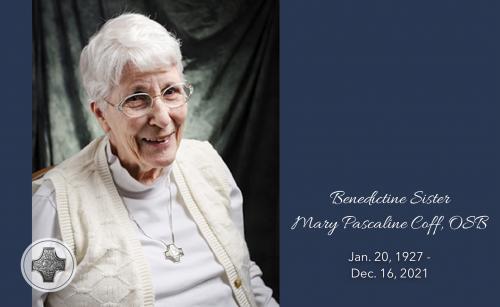Benedictine Sister of Perpetual Adoration Mary Pascaline Coff, OSB, a pioneer of interreligious dialogue, died Dec. 16, 2021.
She was born Margaret Mary on Jan. 20, 1927, in St. Louis to Edward Joseph Coff and Agnes Newsham Coff. She had three older sisters and two adopted brothers. During the Depression, tragedy hit when Margaret Mary’s aunt and uncle died within hours of each other during an influenza epidemic, leaving two orphaned boys. Her parents legally adopted the nephews into their family.
“They were a great blessing and gift to me,” she recalled. As a child, she enjoyed basketball, riding horses, visiting downtown with her mother, and road trips with her father.
Margaret Mary felt called to religious life while in high school at Ursuline Academy. However, her parents urged her to delay entering. She attended Fontbonne College in St. Louis. After graduation, she worked in public relations at Webster College. She appreciated being able to pray in their chapel each day.
“The old struggle came back,” she said. She decided that her heart belonged to Christ.
Margaret Mary visited the Benedictine Sisters’ Missouri monasteries in Clyde and Kansas City and knew it was where she belonged.
“I was deeply devoted to the Sacred Heart and to Christ in the Eucharist,” she said. “I wanted to be with others in community who also loved the Blessed Sacrament.”
Margaret Mary entered on June 3, 1949, made her first profession on May 20, 1951, and her perpetual vows on May 27, 1956. At first, she was disappointed with the name given her: Sister Mary Pascaline. She had hoped to be given a name related to the Sacred Heart. Then she realized there was a connection as the name Pascaline represented the paschal mystery.
Sister Pascaline served the congregation's Missouri monasteries in Kansas City, St. Louis and Clyde; and in Mundelein, Illinois; Tucson, Arizona; Sand Springs, Oklahoma; and San Diego. Her duties included leadership roles as subprioress of San Diego, postulant director and novice director. She served as prioress general of the congregation from 1968 to 1974 and as prioress of the Kansas City monastery. She was the foundress and first superior of Osage Monastery+Forest of Peace in Sand Springs.
As part of the changes before the Second Vatican Council, Sisters Pascaline and Matthias Igoe joined other religious women in studying theology at Saint Mary’s University in Indiana. Both Sisters earned doctoral degrees in 1959. Upon completing her studies, Sister Pascaline was appointed novice director. She served in this position until 1968 when, as the youngest member of the general chapter, the delegates elected her prioress general. Those six years until 1974 were tumultuous years in the Church, times of rapid change along unknown paths. She showed a deep love for the congregation struggling with difficult changes she courageously initiated.
After leadership, Sister Pascaline was given permission to spend the 1976-1977 year in South India with Father Bede Griffiths, OSB Cam. at his ashram, where Benedictine life was expressed in an authentic Indian fashion. For Sister Pascaline, this was a life-changing experience that inspired her to pursue interreligious dialogue.
Sister Pascaline received permission from the congregation to establish a monastic ashram in Sand Springs. For almost three decades until 2008, she and the Sisters hosted private retreats for people of many faiths, and she was a dedicated spiritual director. In rustic surroundings, they welcomed religious seekers and taught prayer in traditional Western and Eastern forms.
Sister Pascaline inspired and taught many. One friend said of her, “She stands so solidly before the Lord; from there, she has the capacity to explore.”
She was co-founder and first executive secretary of the North American Board for East-West Dialogue (NABEWD), which later became Monastic Interreligious Dialogue (MID), and was editor of its newsletter for its first decade. She gave talks at international conferences in Japan, Korea, India and the United States. Two notable ones were the 1993 Parliament of World Religions and the Gethsemani Encounter with the Dalai Lama. In her work with MID, she coordinated eight dialogue exchanges with Tibetan monks and nuns both in exile and in Tibet. She was a trustee and secretary for the Bede Griffiths Trust. Over the years, Sister Pascaline found herself in Japan, Korea, Tibet, France, Switzerland, Germany, Belgium, Canada and Mexico.
Sister Pascaline loved nature, especially the ocean, the mountains, and her beloved, peaceful oak forest in Sand Springs. She enjoyed reading works by the Christian mystics Ruysbroeck and Meister Eckhart as well as the Upanishads.
Sister Pascaline was dedicated to monastic life and to Christ in the Eucharist, while also exploring not just the differences in world religions but their similarities as well.
“Monastic life was a surprise gift that unfolded over the years. I have loved its focus on inner and outer transformation and the call to the breakthrough to ever deeper levels of consciousness, with a community of those with similar goals,” she said.
After suffering a serious fall in 2015, Sister Pascaline moved from the Tucson monastery to Our Lady of Rickenbach Health Care Center at Clyde. Computers and Skype enabled her to keep in touch with many friends throughout the world until her health declined gradually.
She is survived by her monastic family, nieces and nephews, and many friends. Her funeral liturgy and burial will be held Dec. 18, 2021, in Clyde. |



